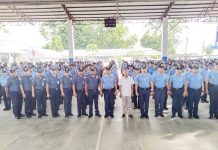
BY HERMAN M. LAGON
MY CHILDHOOD was filled with all sorts of off-the-wall adventures, but amidst all the chaos, there was one constant: my father and his rituals.
At the tender age of four, I learned the art of pikyaw with my neighbors, earning a two-inch scar on my knee in the process. I was taught to swim after my half-brother tossed me, naked, into our fishpond at five. By the time I was five, I had reluctantly abandoned my bibirón at school after being teased by my classmates for still using a baby bottle. And in Grade 1, I penned my first love letter on pink stationery to my crush — who also happened to be my teacher, Ma’am Erdelinda.
As a child, I was terrified of the dark, convinced that the infamous liver-eating aswang, Tenyente Gimo and Maria Labo, would snatch me if I stepped outside after 5 p.m. I believed that demons grew stronger during Semana Santa and Tigkalalag. I was certain the Dinagyang dancers were real Atis, and that swallowing santol seeds would make them sprout in my belly. I even feared looking into any native earthen jar, convinced the “Halimaw sa Banga” was lurking inside, ready to devour me. Just before puberty, I was convinced that a mere five-minute gaze into a girl’s eyes could result in pregnancy.
But while everything else seemed strange and unpredictable, my dad was the epitome of stability and reason.
For my father, every experience had a purpose and everything had a reason. Like the reliable signal of his beloved radio, he followed a routine as regular as the sunrise. Every morning at 6 a.m. sharp, he would turn on the radio to listen to Bombo Radyo’s news broadcast. He would sit in his chair near the Frigidaire, sipping his first cup of coffee while scanning yesterday’s newspapers and magazines. Breakfast, always prepared by my mother, was eaten with the same precision — a spoon and fork in hand. Afterward, he would take a long, ritualized bath and prepare his white uniform and khaki pants for work.
Conversations at the dining table were rare, but when they happened, my father’s inquiries were direct and purposeful: “What have you accomplished lately? How are your grades? How can you improve?” He would always remind me, “Never, ever settle for second best.”
My stern-looking father, known as Papa Saling (his real and complete name was Rosalio Fuentes Lagon), worked as an office accountant and union manager at the now-defunct Panay Railways Incorporated. His office, located just a stone’s throw away from our wooden house in Barangay Lapuz Norte, Lapuz, Iloilo City, was on the third floor. I often visited, watching him meticulously scan through books and ledgers, sometimes for hours, while I entertained myself by collecting candies from his officemates. His desk was always organized — folders on the right side near his Corona typewriter, journals neatly arranged on a shelf by number, color, or height. Even the slightest deviation in this arrangement would result in a week-long ban from his office.
In his workplace, my father was a force to be reckoned with. Every task was documented with the precision of a well-tuned radio dial, all details carefully outlined for the staff to follow. Failure was simply not an option. As the head of his department, he expected his staff to be present and productive until every task was completed. He was always the last to leave the office, his attaché case filled with ledgers for overnight review.
Upon arriving home, my father would place his case on the sala set, turn on the black-and-white television, and ask either me or my mom to turn on the radio — an echo of his morning routine. This was his life on weekdays. (To be continued)/PN







